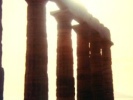
Sacred Texts Classics Index Previous Next
Buy this Book at Amazon.com


Fragments that Remain of the Lost Writings of Proclus, by Thomas Taylor, [1825], at sacred-texts.com
In this book, in which he explains the doctrine of Plato concerning material forms, he says, that qualities and all material forms derive their subsistence, according to Plato, from non-being, and again perish by returning into non-being, when the composite is dissolved. He then adds as follows: "Would it not, however, be better to say, that material forms, and not only qualities, are the things which are said to enter into and depart from matter; for these, and not qualities, are the resemblances of intelligibles? It is worth while, therefore, to survey whither this form departs. If, indeed, it departs into nature, an absurdity will ensue: for nature would receive something similar to the things which are posterior to it, and which proceed from it. Just as if some one should say, that any thing departs from generation into an intelligible essence. But if we should assert that this form departs into another matter, we should speak contrary to what is evident. For when fire is extinguished, and the matter is converted into air, we do not see
that another matter is enkindled [after its departure]. And if material forms are in themselves, they will be intelligibles, and self-subsistent and impartible natures. Whence, therefore, does bulk derive its subsistence'? Whence interval? Whence is the war to obtain possession of a common subject derived? For things which are in themselves do not contend in a hostile manner for a common seat; since neither are they indigent of a certain subject. But if material forms are neither in nature nor in themselves, and it is not possible that such forms should be in matter after their corruption, it is necessary that they should proceed into non-being. For this universe would not remain, matter always remaining, if form alone subsisted without generation, and perished without corruption." *
33:* This extract is only to be found in the Treatise of Philoponus against Proclus on the Eternity of the World.
34:* Forms, when they proceed into matter, and in consequence of this become materialised, resemble (as Plotinus beautifully observes in his Treatise on the Impassivity of Incorporeal Natures) "shadow falling upon shadow, like images in water, or in a mirror, or a dream."